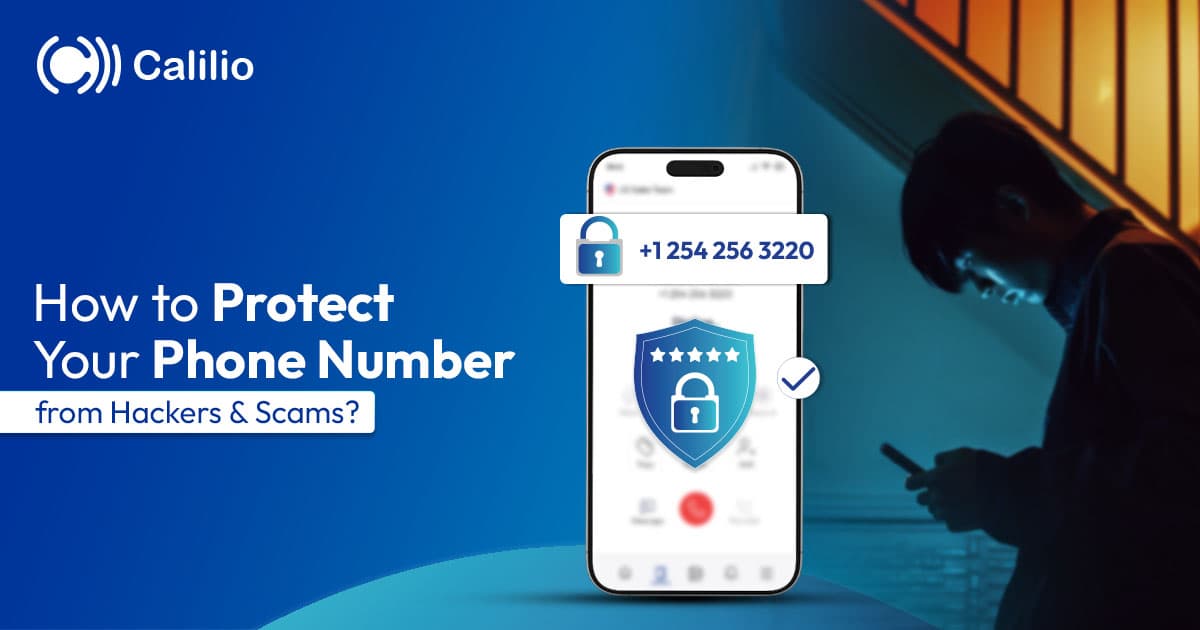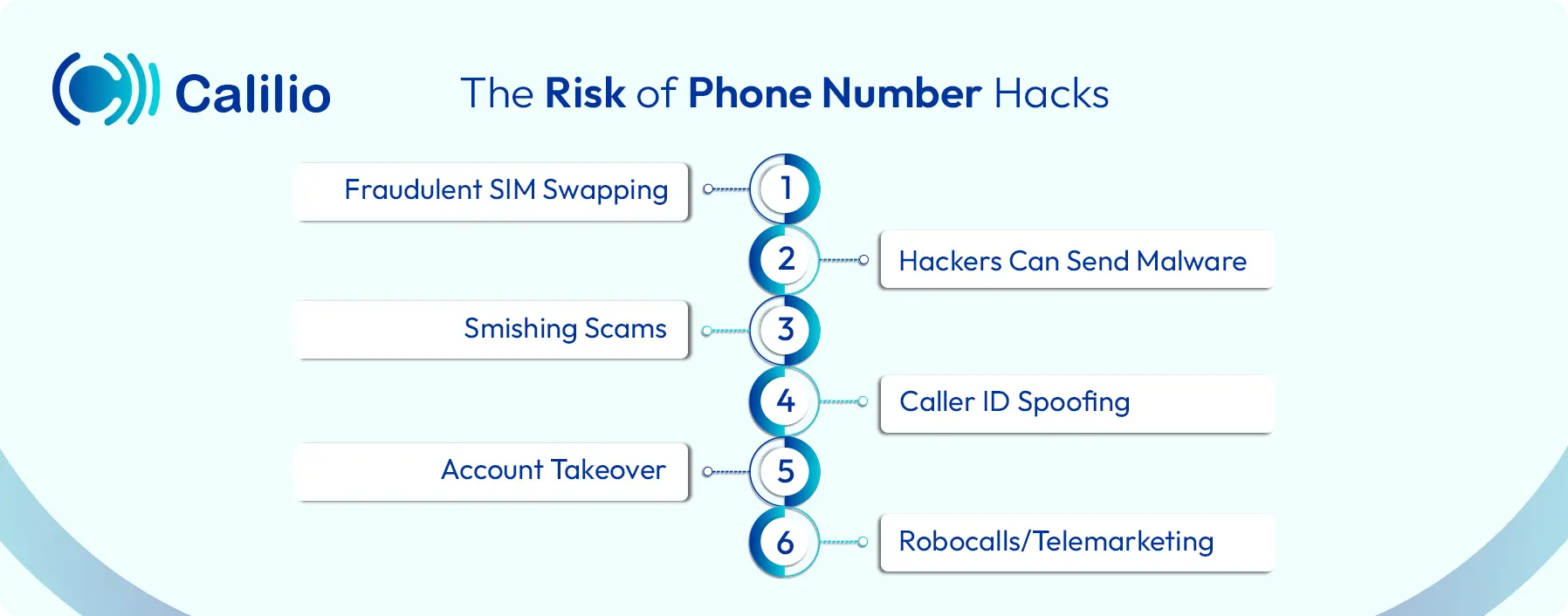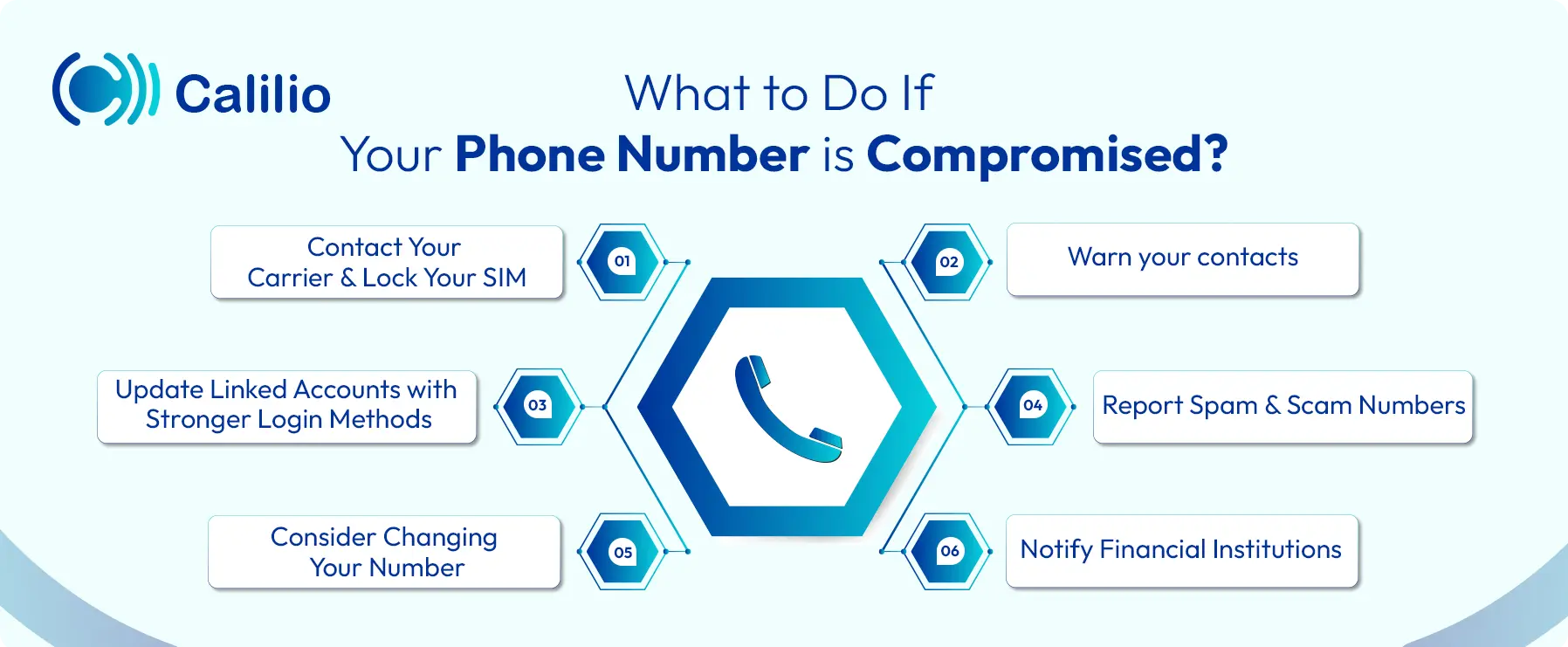How to Protect Your Phone Number: 10 Proven Safety Tips

Summarize this blog with:
Your phone number might seem harmless to share, but it’s often the key to your personal identity. From bank logins to social media accounts, many services use your number for verification, which makes it a prime target for scammers, spammers, and hackers.
If your phone number gets stolen or hacked, criminals can use it to steal your security codes, take over your accounts, access bank accounts, or even pretend to be you when contacting others.
That’s why phone number protection isn’t optional—it’s essential. Just like you lock your house or set strong passwords, you need to take proactive steps to secure your phone number.
In this guide, we’ll cover proven ways to keep your number safe, prevent hacking attempts, and ensure your phone number's safety.
Key Highlights:
If your phone number falls into the wrong hands, it can be misused for SIM swapping, malware attacks, smishing scams, caller ID spoofing, and account takeovers. It can also be exposed to telemarketers and robocallers, resulting in nonstop unwanted calls.
To protect your phone number, enable stronger carrier-level security features such as a secondary PIN, SIM lock, and port-out protection. They can help prevent SIM swapping and unauthorized transfers.
Avoid clicking on suspicious links or replying to unknown texts to avoid phishing and smishing scams.
Use security features such as call filtering and call masking to keep your primary number safe from spam and misuse.
Regularly review connected accounts and unlink your number from services you no longer use to reduce exposure.
If your phone number is hacked or compromised, you need to act fast. Immediately, contact your carrier, secure any linked accounts, alert your contacts, and inform your bank or relevant authorities.
The Risk of Phone Number Hacks
If your phone number isn’t protected, it can be associated with risks such as SIM swapping, which enables account hijacking, or spreading malware through malicious texts. It can also be targeted in smishing scams, abused for caller ID spoofing, and taken over for unauthorized access. Furthermore, exposed numbers often end up with telemarketers and robocallers, leading to nonstop unwanted calls.

- Fraudulent SIM Swapping: Using personal details gathered from phishing emails, data breaches, or your online activity, scammers can trick your mobile carrier into believing they’re you. They can transfer your number to a new SIM card without your knowledge. Once they gain control, they can use it to access your financial accounts or social media accounts.
- Hackers Can Send Malware: Cybercriminals can target your phone number by sending malicious links, files, or texts to your number. If you click on one, spyware or other harmful software can be installed on your phone without you noticing.
- Smishing Scams: Scammers often send fake texts (called smishing) that look like they’re from a bank, delivery service, or even a job recruiter with the intent of phishing. The goal is to get you to click a link and share your personal information like passwords, account numbers, or other sensitive details.
- Caller ID Spoofing: When scammers and spammers know your phone number, they can use it for caller ID spoofing and manipulate their number to look like your number when making calls. As a result, your number may be used in scams.
- Account Takeover: Many platforms and financial apps like banking apps use phone numbers for password resets these days. If hackers gain control of your number, they can easily reset your logins and lock you out of email, banking, or social media.
- Robocalls/Telemarketing: Once your phone number is exposed online, it can easily end up in the hands of telemarketers and robocallers. As a result, you may get continuous unwanted calls.
How to Protect Your Phone Number? Useful Tips
To protect your phone number, limit its online exposure and be cautious of phishing texts or suspicious links. Also, strengthen security by setting a secondary PIN with your carrier, enabling two-factor authentication, adjusting app privacy settings, and using tools like call filtering, spam blocking, virtual numbers, or caller ID masking.
Furthermore, consider registering your number on the Do Not Call list, regularly monitor SIM or number change alerts, and regularly review your connected accounts for any unusual activity.
1. Limit Where You Share It
Sharing your phone number publicly can put you at risk, since strangers may misuse it through Caller ID spoofing. So, be mindful of where and with whom you share your phone number. Give it to trusted people or services, and avoid posting your personal number on social media or public sites where scammers can easily find it.
2. Watch Out for Phishing Texts
If you get a text you weren’t expecting, especially one that asks you to log in, make a payment, or “verify” your account, treat it with caution. Don’t reply, since that confirms your number is active. Don’t click links, as they may lead to fake websites or install malware. And never enter passwords, security codes, or payment details through a text message.
3. Set Up a Secondary Password/PIN with Your Carrier
Most carriers let you add a secondary password or PIN to your account, and setting it up is an effective way to stop SIM swap attacks. With this extra layer of security, even if someone tries to transfer your number to another device, they won’t get access to steal your number without your unique code.
4. Enable Two-Factor Authentication (Preferably with an Authenticator App)
Whenever possible, use an authenticator app or security key instead of SMS codes, since texts can be intercepted if your number is compromised. Two-factor authentication adds an extra step to logging in, making it harder for attackers to break into your accounts.
5. Adjust Privacy Settings on Apps
Many apps make your phone number visible by default, which can expose you to unwanted contacts or scams. Review privacy settings on platforms like WhatsApp, Facebook, and LinkedIn, and limit visibility to “contacts only” or “nobody” whenever possible.
6. Enable Call Filtering and Spam Blocking
You can use call filtering to filter out the incoming calls and block the spam numbers. It displays the number with labels like scam likely, spam risk, and more. Also, the calls from unknown numbers will be silenced or sent to voicemail to reduce direct contact with unknown callers.
Moreover, you can also install trusted third-party apps to automatically detect and silence spam, reducing the risk of taking spam calls and falling for fraudulent calls.
7. Use a Secondary or Virtual Number
To secure a phone number, use two different numbers for business and personal purposes. Keep your personal line private and use a secondary or virtual number for business calls, online sign-ups, or public platforms.
Use a virtual phone number for your business and use it for business calls, online sign-ups, or display it in online platforms. Many virtual phone number providers let you screen calls, block repeat spammers, or send unknown numbers to voicemail. This way, you can prevent your primary phone number from being spammed or hacked.
8. Try Call Masking (Useful for Business/Freelance Calls)
When dealing with clients or customers, don’t share your personal number directly. Instead, use call masking to hide your real number, and a substitute—either a temporary or business line—is displayed to the other end. It keeps you reachable during work sessions while protecting your private number. Once the session ends, the masked number expires or becomes unreachable, preventing unwanted follow-ups or misuse.
9. Register on the Do Not Call List
Users should add their numbers to the Do Not Call (DNS) registry to help reduce telemarketing calls. Though it won’t block scams entirely, it does minimize the unwanted inbound calls and makes it easier to avoid suspicious ones.
10. Never Click or Reply to Suspicious Emails or Texts
Scammers often disguise emails and texts as urgent account alerts, password resets, or prize offers. Clicking on one can send you to fake websites or install harmful software, and replying confirms your number is active. If you’re unsure about the source’s trustworthiness, delete the message and contact the company only through their official site or app. Also, use the SMS filter to prevent messages from unknown and harmful sources.
11. Monitor SIM/Number Change Alerts
Be aware that if you get a message about a SIM or number change you didn’t request, call your carrier immediately. The sooner you act, the faster they can block the unauthorized change and keep control of your phone number in your hands.
12. Review Connected Accounts Regularly
Many apps, such as social media, ride-sharing, and shopping, ask for your number. Review regularly which services have access and remove any you no longer use. The fewer the connections, the fewer chances to hack a cell number.
What to Do If Your Phone Number is Compromised?
Following all these precautions can only reduce the risk of getting spammed. In any case, if your phone number is compromised, you must act fast and contact your carrier to lock your SIM and warn your contacts so they don’t fall for scams in your name.

- Contact Your Carrier and Lock Your SIM: Report the issues to your carrier immediately and let them know of a potential SIM swap attempt. Ask them to lock your SIM or add extra security, so no one else can make changes to your phone number or port your number without your knowledge.
- Warn your contacts: If your number is compromised, scammers may pose as you through calls or texts. You need to inform your friends and family not to trust unusual requests or links. A quick heads-up by email or social media can stop scammers from fooling the people who trust you.
- Update Linked Accounts with Stronger Login Methods: To prevent further damage, review accounts tied to your number, especially email, banking, and social media. Replace SMS codes with an authenticator app or security key, which don’t depend on your number and can’t be intercepted through a hacked SIM.
- Report Spam and Scam Numbers: Inform your carrier about suspicious calls or texts and report them to the appropriate authority (like the Federal Trade Commission, in the U.S. or your local regulator). Also, file a report with your local police department and file an official report to take revenge on spam callers with fraudulent charges.
- Consider Changing Your Number: If the problem doesn’t go away or your number is widely exposed in leaks or scams, ask your carrier for a new number. It’s inconvenient, but it can give you a fresh start and better security. Avoid further use of that number and take proper precautions to protect the new number.
- Notify Financial Institutions: If your phone number was used on banking or payment accounts, contact those institutions right away. Let them know about the possible fraud, and ask them to freeze, monitor, or close affected accounts to stop unauthorized access.
Conclusion
Phone number protection is no longer optional- it’s a must. Hackers use tactics like SIM swapping, phishing, and caller ID spoofing to compromise numbers, which can lead to account takeovers and financial fraud.
The best way to protect your phone number from hackers is to limit where you share it, enable carrier PINs, and use features like call filtering. Plus, you can use virtual numbers for online activities to keep your primary number secure while you stay connected.
Calilio makes this easier by offering secure virtual numbers, along with different capabilities that help block spam and prevent unwanted access. For instance, you get virtual phone numbers with a caller ID feature, so you can display a different number instead of your personal one. This keeps your real phone number private. As a result, you strengthen number security and protect it from hackers.
Calilio Introduces Affiliate Program
Earn 30% lifetime commission on every paid referral.
Turn your audience, network, or customers into a recurring revenue stream.

30% recurring commission on every paid referral

Lifetime earnings for as long as the customer stays subscribed

Unique referral link with real-time tracking

Perfect for agencies, consultants, creators, and SaaS partners

Frequently Asked Questions
Can I Protect My Phone Number?
Yes, you can protect your phone number by sharing it only with trusted people and sites, setting a carrier PIN to prevent SIM swaps, and using a virtual number for business or online use.
Can I Check If My Phone Number Is Hacked?
Can Someone Use My Phone Number Without Me Knowing?

Still have questions?
Can’t find the answer you’re looking for? Please chat with our friendly team.
Stay in the loop
Get the latest call insights, trends, and updates delivered straight to your inbox.
By subscribing, you agree to receive updates from Calilio.
You can unsubscribe anytime.